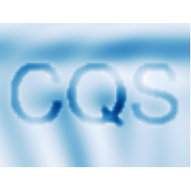
Complex Quantum Systems
We consider complexity and associated phenomena emerging in quantum matter: from low-dimensional (topological) materials to quantum gases, from classical to quantum, from integrability to many-body quantum chaos, from few to many particles.
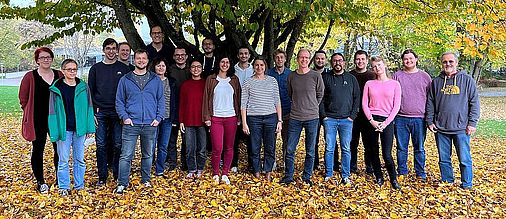
Our group with guests (Yuriko Baba, Prof. Caio Lewenkopf, Prof. Steven Tomsovic)
________________________________________________________________________
2025: News and Events
__________________________________________________________________________________
A Chronicle Conversation with Klaus Richter (July 3, 2025)
 Prof. Klaus Richter was interviewed by the UN Chronicle as part of the International Year of Quantum Science and Technology. You can read the interview here.
Prof. Klaus Richter was interviewed by the UN Chronicle as part of the International Year of Quantum Science and Technology. You can read the interview here.
(copyright of the photo © DPG/Marschalsky )
__________________________________________________________________________________
Poster prize for Lukas Beringer at CAPS and CQA Winter School on Ultracold Quantum Many-body Systems (February 20, 2025)

The prize was awarded to Lukas Beringer for his presentation of the poster entitled "Controlling Many-Body Quantum Chaos: Bose-Hubbard Systems" during the "CAPS and CQA Winter School on Ultracold Quantum Many-body Systems" held in the Centro de Ciencias de Benasque (Spain) from February 16th to February 22nd 2025.
__________________________________________________________________________________
Young Colloquium der Regensburger Physik: Ein Podium über Klima und Kommunikation (January 1, 2025)

__________________________________________________________________________________
Statistical analysis of complex many-body states reveals hidden structure
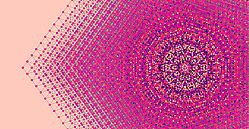
Statistical mechanics is largely based on the assumption of ergodicity, which is reflected in a quasi-random behavior of corresponding many-particle quantum states. Such a behavior is already mimicked by a single quantum particle in a complex geometry with a wave function resembling a random spatial landscape. Nearly half a century ago, however, silent spatial correlations had been explored by Michael Berry upon superimposing random plane waves. Here we show that corresponding structures also exist in the huge dimensional (Fock) space of quantum fields describing quantum mechanical many-body systems. We show how corresponding correlations in many-body space can be unveiled -- with possible implications for the statistical physics of cold atoms.
________________________________________________________________________
2024: News and Events
__________________________________________________________________________________
Prof. Dr. Wolfgang Ketterle (December 16, 2024)
2001 Nobel Laureate Wolfgang Ketterle (MIT) visited our group and the department giving a great colloquium talk

copyright: Julia Dragan
__________________________________________________________________________________
Symposium of the DPG (October 21 - 23, 2024)
"Die Zukunft unseres Klimas: Komplexe Herausforderungen von der Physik bis in die Gesellschaft"
(The future of our climate: complex changes from physics to society) at Magnus-Haus Berlin

more information can be found here (in German)
Scientific organizers:
K. Richter, St. Falk, A. Löschel, F. Neumann, V. Wirth, K.F. Ziegahn
__________________________________________________________________________________
Quantum simulation and computation at the edge of chaos
organized by K. Richter and J.D. Urbina at the

XLIV Dynamics Days Europe
Bremen, July 29 - August 2, 2024
__________________________________________________________________________________
German-Taiwanese Quantum Materials Day (July 19, 2024)
This event brings together colleagues from both countries working in condensed matter physics, low-dimensional materials, and correlated states of matter. Geared primarily towards young researchers, this symposium offers a unique opportunity to connect, share knowledge, and build international relations.
Program can be found here.
__________________________________________________________________________________
Taiwanese-German WE-Heraeus-Seminar (July 14 - 18, 2024)
From Fundamentals to the Future: Advancing Functionalities of Two‐Dimensional Quantum Materials
at Evangelische Akademie Tutzing
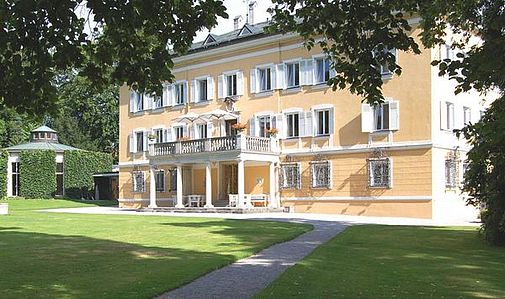
Scientific organizers:
K. Richter, A. Knothe, (Universität Regensburg), M.-H. Liu, T.-M. Chen (National Cheng Kung University, Taiwan
__________________________________________________________________________________
Klaus Richter DPG president for the term 2024-2026 April 1, 2024)
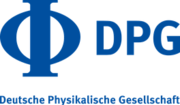
________________________________________________________________________
2023: News and Events
__________________________________________________________________________________
Meeting at UR (December 6-8, 2023)
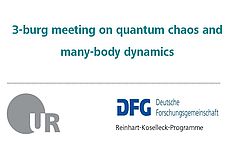
The program can be found here.
__________________________________________________________________________________
Quantum survivors in a chaotic sea
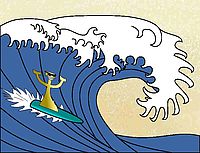 Non-equilibrium quantum states formed from many particles are extremely fragile and usually do not survive for long, but "decay" rapidly: they thermalize due to chaos. In a recent publication we show that, intriguingly, there exist such survivors in ultracold atomic gases that, despite chaotic dynamics, perform hundreds of stable oscillations as a unique signature of stability and quantum coherence. The observation of such "many-body scars" opens up far-reaching implications for the occurrence and preparation of stable macroscopic quantum states.
Non-equilibrium quantum states formed from many particles are extremely fragile and usually do not survive for long, but "decay" rapidly: they thermalize due to chaos. In a recent publication we show that, intriguingly, there exist such survivors in ultracold atomic gases that, despite chaotic dynamics, perform hundreds of stable oscillations as a unique signature of stability and quantum coherence. The observation of such "many-body scars" opens up far-reaching implications for the occurrence and preparation of stable macroscopic quantum states.
__________________________________________________________________________________
International Presidential Visiting Scholar Fellowship 2023 for Prof. Ming-Hao Liu
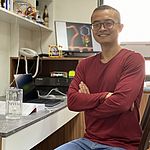 The executive board of the University of Regensburg awards Ming-Hao Liu (National Cheng Kung University in Tainan, Taiwan) this fellowship for the year 2023. It comprises financial support for a research stay in our group during July, where he will work on Electron Optics in Graphene and on research topics related to SFB 1277. Furthermore, he will give a lecture on Electronic transport in a nutshell: from free electron gas to graphene.
The executive board of the University of Regensburg awards Ming-Hao Liu (National Cheng Kung University in Tainan, Taiwan) this fellowship for the year 2023. It comprises financial support for a research stay in our group during July, where he will work on Electron Optics in Graphene and on research topics related to SFB 1277. Furthermore, he will give a lecture on Electronic transport in a nutshell: from free electron gas to graphene.
__________________________________________________________________________________
Controlling Quantum Chaos: Optimal Coherent Targeting
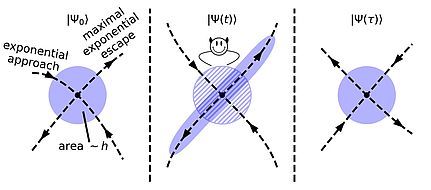
Chaotic dynamics has the propensity to be the villain of quantum device control as it leads rapidly to scrambling of quantum information and entropy production, certainly a fundamental hindrance to controlling quantum evolution. We could show that chaos, conversely, can be harnessed to control and efficiently guide the evolution of a complex quantum system toward desired states of matter, i.e. targeting. In effect, is it possible to mimic a quantum Maxwell demon to some extent.
The work has been published in Physical Review Letters.
________________________________________________________________________
2022: News and Events
__________________________________________________________________________________
Professor of the year 2022 (November 16, 2022)
 Klaus Richter has been awarded the title "professor des Jahres" by the UNICUm Foundation.
Klaus Richter has been awarded the title "professor des Jahres" by the UNICUm Foundation.
(picture @UNICUM)
__________________________________________________________________________________
Klaus Richter designated DPG president (November 11, 2022)
 The Vorstandsrat of the German Physical Society (DPG) has elected Klaus Richter as next DPG president fpr the term 2024-2026.
The Vorstandsrat of the German Physical Society (DPG) has elected Klaus Richter as next DPG president fpr the term 2024-2026.
(picture @DPG)
__________________________________________________________________________________
Semiclassical Roots of Universality in Many-Body Quantum Chaos (November 11, 2022)
Our Topical Review has been published in Journal of Physics A.
__________________________________________________________________________________
New group member (October 1, 2022)
Dr. Angelika Knothe joins our group as Wissenschaftliche Assistentin.
__________________________________________________________________________________
Vorwärts in die Vergangenheit - Highlights der Physik (September 24, 2022)
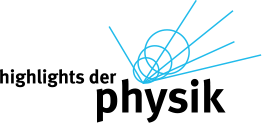 A public lecture by Klaus Richter given during the "Highlights der Physik" can be found here.
A public lecture by Klaus Richter given during the "Highlights der Physik" can be found here.
(picture @Highlights der Physik)
________________________________________________________________________
Focus Workshop at UR (July 8-9, 2022)
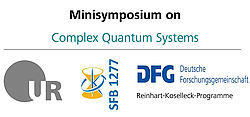 Program can be found here.
Program can be found here.
__________________________________________________________________________________
Talk about the DPG by Klaus Richter (June 22, 2022)
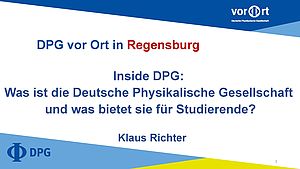
__________________________________________________________________________________
EXIST start-up stipend for Camilo Moreno (May 30, 2022)
Camilo Moreno, who received his PhD in our group in 2021, and Tobias Lautenschäger
will be funded for their business idea "Symlab" (see here).
__________________________________________________________________________________
Die Verschränkung von Chaos und Quantendynamik
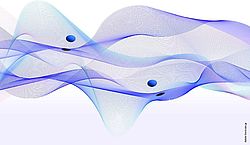 An invited overview article by Klaus Richter has been published in Physik Journal (in German) in March 2022. A preprint is found here. The published version is accessible for DPG members.
An invited overview article by Klaus Richter has been published in Physik Journal (in German) in March 2022. A preprint is found here. The published version is accessible for DPG members.
(picture @DPG, Physik Journal)
________________________________________________________________________
2021: News and Events ________________________________________________________________________
Workshop at MPI-PKS Dresden (October 11 – 15, 2021)
Probing complex quantum dynamics through out-of-time-ordered correlators Scientific Coordinators: Rodolfo Jalabert, Klaus Richter (more information here).
__________________________________________________________________________________
Symposium within the meeting of the Condensed Matter Division of the German Physical Society (September 26 - October 1, 2021)
Facets of Many-Body Quantum Chaos; organized by Markus Heyl and Klaus Richter.
__________________________________________________________________________________
International Workshop "Emergent Relativistic Effects in Condensed Matter" at UR (September 22 - 24, 2021)
More informations can be find here.
__________________________________________________________________________________
Generating high harmonics in topological insulators
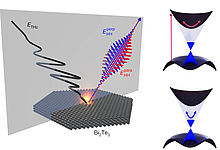 In a collaboration of the experimental groups of Rupert Huber (UR) and Ulrich Höfer (University of Marburg) with the group of Ferdinand Evers (UR) and us on the theory side, a novel mechanism for generating high-order harmonics in the surface states of a topological insulator has been discovered. When quasi-relativistic electrons are accelerated through the Dirac point by an intense lightwave, they abruptly reverse their velocity allowing for purely non-integer high-harmonics.
In a collaboration of the experimental groups of Rupert Huber (UR) and Ulrich Höfer (University of Marburg) with the group of Ferdinand Evers (UR) and us on the theory side, a novel mechanism for generating high-order harmonics in the surface states of a topological insulator has been discovered. When quasi-relativistic electrons are accelerated through the Dirac point by an intense lightwave, they abruptly reverse their velocity allowing for purely non-integer high-harmonics.
This work is published in Nature (May 2021)
Press release here.
__________________________________________________________________________________
Very weak bonds to artificial atoms formed by quantum corrals
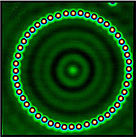 Employing numerical simulations we have accompanied and explained experiments of the Giessibl group (UR), who explored the bonding properties of the quantum corral (a circle of 48 iron atoms placed on a copper surface) as an artificial atom using an atomic force microscope (AFM). The confined electronic states can form a bond to the front atom of the AFM. The measured forces are about 1/1000 of typical forces in atomically resolved AFM. The confined electrons showed covalent attraction to metal tips and Pauli repulsion to CO-terminated tips.
Employing numerical simulations we have accompanied and explained experiments of the Giessibl group (UR), who explored the bonding properties of the quantum corral (a circle of 48 iron atoms placed on a copper surface) as an artificial atom using an atomic force microscope (AFM). The confined electronic states can form a bond to the front atom of the AFM. The measured forces are about 1/1000 of typical forces in atomically resolved AFM. The confined electrons showed covalent attraction to metal tips and Pauli repulsion to CO-terminated tips.
This work is published in Science (May 2021)
Press release here.
The work is also feautured in ChemistryWorld.
__________________________________________________________________________________
Second funding period for CRC 1277
DFG has approved our application for a second funding period from July 2021 until June 2025.
Press release here.
__________________________________________________________________________________
PD Dr. Cosimo Gorini
Congratulations: Cosimo Gorini has finished his habilitation with the thesis “Pseudospin- and spin-orbit coupled dynamics: from normal metals to Dirac systems” and becomes Privatdozent at University of Regensburg (April 2021).
__________________________________________________________________________________
Klaus Richter receives DFG funding for a Reinhart Koselleck project
![]()
DFG has recently approved his application for the project "Many-Body Quantum Processes at the Edge of Chaos: From Non-Equilibrium Thermodynamics towards Quantum Gravity" and supports his research with 750.000 € for 5 years. According to DFG the Reinhart Koselleck programme enables outstanding researchers to pursue exceptionally innovative, higher-risk projects (April 2021).
Press release here.
__________________________________________________________________________________
A Renormalized Semiclassical Expansion in Quantum Critical Many-Body Systems
We have developed a general framework that shows how in the quasiclassical regime (N ≫ 1) the dynamics of an N-particle quantum system at a critical point is governed by an effective Planck constant, renormalized through the leading Lyaponov exponent. For scrambling in many-body hyperbolic systems, our results provide formal grounds to a conjectured multiexponential form of so-called out-of-time-ordered correlators.
This work is published in Physical Review Letters (March 2021).
________________________________________________________________________
2020: News and Events ________________________________________________________________________
Cosimo Gorini receives researcher position at CEA Saclay
Cosimo Gorini has accepted an offer for a permanent researcher position at the Service de Physique de l'Etat Condensé (Condensed Matter Physics Laboratory) of CEA Saclay, France, starting December 2020. __________________________________________________________________________________
Probing Dirac Surface States via Quantum Capacitance
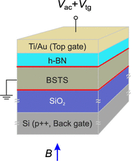 We model the electronic density of states probed by capacitance experiments of the Weiss group at UR in thin layers of the topological insulator BiSbTeSe2. The results point at the coexistence and intimate coupling of Dirac surface states with a bulk many-body phase (a Coulomb glass) in 3D-TIs.
We model the electronic density of states probed by capacitance experiments of the Weiss group at UR in thin layers of the topological insulator BiSbTeSe2. The results point at the coexistence and intimate coupling of Dirac surface states with a bulk many-body phase (a Coulomb glass) in 3D-TIs.
This work is published in Nanoletters (November 2020).
__________________________________________________________________________________
Hexagonal Cyclotron Motion in Graphene Superlattices
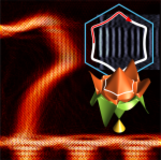 In collaboration with the groups of R. Danneau (Karlsruhe) and M.-H- Liu (Tainan) we found that Dirac quasiparticles originating from graphene superlattice minibands do not undergo conventional cyclotron motion but follow more subtle trajectories. In particular, dynamics at low magnetic fields is characterized by peculiar, straight trajectory segments. Our results open up novel possibilities to use periodic potentials in electron optics experiments.
In collaboration with the groups of R. Danneau (Karlsruhe) and M.-H- Liu (Tainan) we found that Dirac quasiparticles originating from graphene superlattice minibands do not undergo conventional cyclotron motion but follow more subtle trajectories. In particular, dynamics at low magnetic fields is characterized by peculiar, straight trajectory segments. Our results open up novel possibilities to use periodic potentials in electron optics experiments.
This work is published as an Editor’s suggestion in Physical Review Letters (November 2020)
Press release here. __________________________________________________________________________________
Novel Gate-Tunable Two-Dimensional Superlattices in Graphene
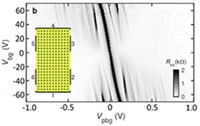 Together with our long-term collaborator, M.-H- Liu (Tainan), we provided theory support for experiments of the Eroms/Weiss group at UR, using a new technique for gate-tunable superlattices in graphene by the combined action of a back gate and a few-layer graphene patterned bottom gate. Thereby, well-pronounced satellite Dirac points and signatures of the Hofstadter butterfly are observed in corresponding transport measurements and theoretically explained.
Together with our long-term collaborator, M.-H- Liu (Tainan), we provided theory support for experiments of the Eroms/Weiss group at UR, using a new technique for gate-tunable superlattices in graphene by the combined action of a back gate and a few-layer graphene patterned bottom gate. Thereby, well-pronounced satellite Dirac points and signatures of the Hofstadter butterfly are observed in corresponding transport measurements and theoretically explained.
This work is published in Nanoletters (October 2020)
__________________________________________________________________________________
Spin relaxation in superconductors: resonant vs. off-resonant spin-flip scatterering
In a joint work with D. Kochan and colleagues from the Fabian group at UR, we investigate the relaxation of quasiparticle spins in graphene proximitized by an s-wave superconductor in the presence of resonant magnetic and spin-orbit active impurities. We show that for resonant scattering the spin relaxation decreases with decreasing temperature, opposite to what is known for off-resonant scattering.
This work is published in Physical Review Letters (August 2020)
__________________________________________________________________________________
The electronic thickness of graphene
 Graphene is often considered the thinnest existing material, but how thick are two atomically close graphene layers? Together with the Ensslin group (Zurich) doing transport measurements and with our theory colleagues, M.-H. Liu (Tainan) and M. Kurpas (Katowice), performing transport calculations, we investigate the electrostatics of two twisted graphene layers. We determine the finite dielectric thickness of each graphene layer to be ≈ 2.6 Å.
Graphene is often considered the thinnest existing material, but how thick are two atomically close graphene layers? Together with the Ensslin group (Zurich) doing transport measurements and with our theory colleagues, M.-H. Liu (Tainan) and M. Kurpas (Katowice), performing transport calculations, we investigate the electrostatics of two twisted graphene layers. We determine the finite dielectric thickness of each graphene layer to be ≈ 2.6 Å.
This work is published in Science Advances (March 2020)
__________________________________________________________________________________
Trapping Dirac Fermions in a Quantum Magnetic Bottle
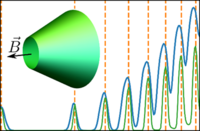 We show that topological insulator nanocones exhibit intriguing mesoscopic surface transport phenomena, including the quantum Hall effect. Furthermore, a nanocone may act as a quantum magnetic bottle, confining surface Dirac electrons, leading to a largely interaction-dominated regime of Coulomb blockade type and, moreover, suggesting that TI nanocone junctions may serve as building blocks for Dirac electron optics setups.
We show that topological insulator nanocones exhibit intriguing mesoscopic surface transport phenomena, including the quantum Hall effect. Furthermore, a nanocone may act as a quantum magnetic bottle, confining surface Dirac electrons, leading to a largely interaction-dominated regime of Coulomb blockade type and, moreover, suggesting that TI nanocone junctions may serve as building blocks for Dirac electron optics setups.
This work is published as an Editor’s suggestion in Physical Review Letters (March 2020)
Press release here.
________________________________________________________________________
2019: News and Events ________________________________________________________________________
Interview with Professor Hans Joachim Schellnhuber
Prof. H. J. Schellnhuber (Director Emeritus of the Potsdam Institute for Climate Impact Research), when visiting the University of Regensburg on the occasion of the UR Dies Academicus 2019, spoke with Klaus Richter about his memories as a student at the Physics Department, his scientific career and about global warming. A written version of this conversation can be found here (in German).
__________________________________________________________________________________
Many-Body Quantum Interference in Chaotic Bosonic Systems
Quantum interference plays a prominent role in the far-out-of-equilibrium dynamics of many-body systems. Here, we examine a particular interference effect arising from discrete symmetries, which can significantly enhance quantum observables with respect to classical predictions. For the Bose-Hubbard model we further show strong evidence for the presence of dynamical localization.
This work is published in Physical Review Letters (November 2019).
__________________________________________________________________________________
Reversible quantum information spreading in many-body systems
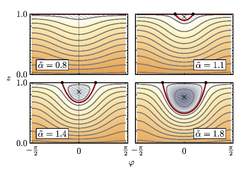 Quantum chaotic interacting many-body systems are assumed to show fast and irreversible spreading of quantum information on short time scales. Here, we show that, in contrast to this common notion, certain quantum critical many-body systems exhibit oscillatory behavior between reentrant localization and delocalization of information in Hilbert space.
Quantum chaotic interacting many-body systems are assumed to show fast and irreversible spreading of quantum information on short time scales. Here, we show that, in contrast to this common notion, certain quantum critical many-body systems exhibit oscillatory behavior between reentrant localization and delocalization of information in Hilbert space.
This work is published in Physical Review Letters (October 2019) __________________________________________________________________________________
Spectral Universality in Repulsive Bose Gases
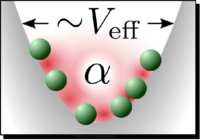 We show that the crossover from an ideal Bose gas to the strongly correlated, fermionized gas exhibits universal behavior: Quantum systems from very few and up to many particles share the same underlying spectral features. Our method provides predictions for excitation spectra that enable access to finite-temperature thermodynamics in large parameter ranges.
We show that the crossover from an ideal Bose gas to the strongly correlated, fermionized gas exhibits universal behavior: Quantum systems from very few and up to many particles share the same underlying spectral features. Our method provides predictions for excitation spectra that enable access to finite-temperature thermodynamics in large parameter ranges.
This work is published in Physical Review Letters (June 2019)
__________________________________________________________________________________
Klaus Richter reelected as DPG board member
Klaus Richter has been elected for another two years as member of the board of the German Physical Society (DPG), responsible for DPG’s scientific programs and prizes (March 2019). __________________________________________________________________________________
Klaus Richter receives Physik-Preis Dresden
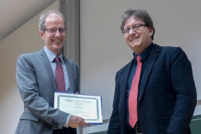 The prize is jointly awarded by the TU Dresden and the Max Planck Institute for the Physics of Complex Systems (January 2019)
The prize is jointly awarded by the TU Dresden and the Max Planck Institute for the Physics of Complex Systems (January 2019)
Press releases here and here.

